 CAIRO, Egypt (AP) — It’s the Mideast version of a sordid soap opera. A Lebanese pop star is brutally slain in her luxury Dubai apartment, her throat slashed. Arrested in her death: One of Egypt’s most politically connected businessmen, accused of paying $2 million to have her killed.The killing of Suzanne Tamim has gone beyond a lurid crime story to something more serious — a glimpse into the close links between Egypt’s government and powerful business tycoons long viewed as above the law. It is also exposing strains between societies like Egypt’s, where wealth and political power increasingly go hand in hand, and Dubai, which recently launched a high-profile push against corruption. People in the Arab world have long followed with fascination and moral clucking the tales of businessmen and politicians cavorting with actresses, belly-dancers and singers — a sort of Hollywood Babylon in the conservative Muslim Middle East. But even by those standards, the Tamim drama is a stunner. The 30-year-old singer, famed for her striking green eyes, was found dead in her Dubai apartment in July, with multiple stab wounds and a 20-centimeter (8 inch) slash across her throat. This week, Egyptian authorities arrested real estate mogul Hisham Talaat Moustafa, said to be Tamim’s former lover. For many, the surprise wasn’t Moustafa’s alleged involvement — but his arrest. Egyptians are widely convinced their government won’t touch influential businessmen. When Moustafa’s name first appeared in media reports weeks ago, he denied a role and complained on Egyptian television that the rumors hurt the economy. The government promptly banned press reports on the slaying, suggesting that Moustafa was off-limits. The tycoon is a top ruling party official close to President Hosni Mubarak’s powerful son, Gamal. In the past 10 years, he has become one of Egypt’s top billionaires, the owner of luxury hotels and beach resorts and a leading force in building Western-style suburbs ringing Cairo for the upper-class.But on Tuesday, Egypt’s public prosecutor accused the tycoon of contracting for the singer’s killing by paying $2 million to Mohsen el-Sukkary, a former Egyptian state security officer.
CAIRO, Egypt (AP) — It’s the Mideast version of a sordid soap opera. A Lebanese pop star is brutally slain in her luxury Dubai apartment, her throat slashed. Arrested in her death: One of Egypt’s most politically connected businessmen, accused of paying $2 million to have her killed.The killing of Suzanne Tamim has gone beyond a lurid crime story to something more serious — a glimpse into the close links between Egypt’s government and powerful business tycoons long viewed as above the law. It is also exposing strains between societies like Egypt’s, where wealth and political power increasingly go hand in hand, and Dubai, which recently launched a high-profile push against corruption. People in the Arab world have long followed with fascination and moral clucking the tales of businessmen and politicians cavorting with actresses, belly-dancers and singers — a sort of Hollywood Babylon in the conservative Muslim Middle East. But even by those standards, the Tamim drama is a stunner. The 30-year-old singer, famed for her striking green eyes, was found dead in her Dubai apartment in July, with multiple stab wounds and a 20-centimeter (8 inch) slash across her throat. This week, Egyptian authorities arrested real estate mogul Hisham Talaat Moustafa, said to be Tamim’s former lover. For many, the surprise wasn’t Moustafa’s alleged involvement — but his arrest. Egyptians are widely convinced their government won’t touch influential businessmen. When Moustafa’s name first appeared in media reports weeks ago, he denied a role and complained on Egyptian television that the rumors hurt the economy. The government promptly banned press reports on the slaying, suggesting that Moustafa was off-limits. The tycoon is a top ruling party official close to President Hosni Mubarak’s powerful son, Gamal. In the past 10 years, he has become one of Egypt’s top billionaires, the owner of luxury hotels and beach resorts and a leading force in building Western-style suburbs ringing Cairo for the upper-class.But on Tuesday, Egypt’s public prosecutor accused the tycoon of contracting for the singer’s killing by paying $2 million to Mohsen el-Sukkary, a former Egyptian state security officer.
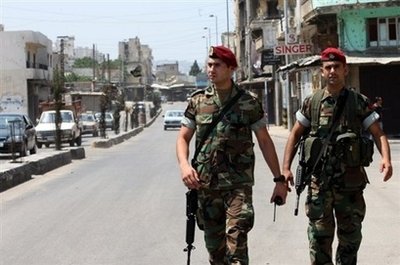 BEIRUT (AFP) – Anti-Syria parliamentary majority leader Saad Hariri has accused Syrian President Bashar al-Assad of trying to use unrest in north Lebanon to engineer a return to military control of the country, a statement received by AFP on Saturday said. "Those who export terrorism to north Lebanon do not have the right to fear the rise of extremism in Lebanon," Hariri said during Friday’s Ramadan meal."(The Syrians) want to use the situation in Tripoli as a pretext to involve themselves in Lebanese affairs and use it as a means for their military and security return to Lebanon," the Future Movement chief said.Assad said on Thursday he had asked Lebanese President Michel Sleiman to urgently send more troops to northern Lebanon to combat what he called "extremism." "The Lebanese clearly remember who sent Fatah al-Islam to Nahr al-Bared and to the north and who has — and continues to — finance terrorist activities in other regions," Hariri’s statement added. The Nahr al-Bared Palestinian refugee camp north of Tripoli was the scene of a deadly 15-week battle last year between the army and Fatah al-Islam, which adopted an ideology inspired by Al-Qaeda.
BEIRUT (AFP) – Anti-Syria parliamentary majority leader Saad Hariri has accused Syrian President Bashar al-Assad of trying to use unrest in north Lebanon to engineer a return to military control of the country, a statement received by AFP on Saturday said. "Those who export terrorism to north Lebanon do not have the right to fear the rise of extremism in Lebanon," Hariri said during Friday’s Ramadan meal."(The Syrians) want to use the situation in Tripoli as a pretext to involve themselves in Lebanese affairs and use it as a means for their military and security return to Lebanon," the Future Movement chief said.Assad said on Thursday he had asked Lebanese President Michel Sleiman to urgently send more troops to northern Lebanon to combat what he called "extremism." "The Lebanese clearly remember who sent Fatah al-Islam to Nahr al-Bared and to the north and who has — and continues to — finance terrorist activities in other regions," Hariri’s statement added. The Nahr al-Bared Palestinian refugee camp north of Tripoli was the scene of a deadly 15-week battle last year between the army and Fatah al-Islam, which adopted an ideology inspired by Al-Qaeda.
A statement issued by the ruling majority on Thursday night said Assad has no right to ask the Lebanese president to send Lebanese army units to northern Lebanon, and such a request is an "interference in Lebanese internal affairs, and result from non-recognition of Lebanon’s sovereignty and independence."
The statement also said such an request is "an insult to Lebanese president." Assad Thursday said at a press conference that he had told the Lebanese president during the latter’s visit to Damascus to send more troops to northern Lebanon to stop clashes between Sunnis and Alawites in Tripoli and some villages of Akkar province. During the past three months, clashes between the two sects in northern Lebanon have left more than 23 people killed and hundred others wounded. Meanwhile, Assad’s invitation for talks with Israel was also rejected by the Lebanese ruling coalition, saying "Lebanon will be the last country to sign settlement agreement with Israel after reclaiming Arab rights."
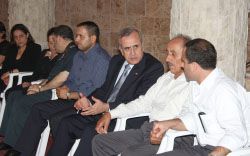 Daily Star – BEIRUT: Lebanese President Michel Sleiman and newly appointed commander of the Lebanese Armed Forces General Jean Kahwaji offered condolences on Saturday to the family of First Lieutenant Samer Hanna, who was killed when his helicopter was hit by Hizbullah gunfire on Thursday. Hanna’s helicopter was shot at during a training session in the Sejod Hills in Southern Lebanon, a region known to be a Hizbullah stronghold. Sleiman and Kahwaji paid separate visits to Hanna’s family at their residence in the northern town of Tannourine. The army officer was laid to rest on Friday. Meanwhile, judicial authorities on Saturday continued to investigate the Thursday’s incident after Hizbullah handed over the assailant and said that the incident had been the result of "confusion."
Daily Star – BEIRUT: Lebanese President Michel Sleiman and newly appointed commander of the Lebanese Armed Forces General Jean Kahwaji offered condolences on Saturday to the family of First Lieutenant Samer Hanna, who was killed when his helicopter was hit by Hizbullah gunfire on Thursday. Hanna’s helicopter was shot at during a training session in the Sejod Hills in Southern Lebanon, a region known to be a Hizbullah stronghold. Sleiman and Kahwaji paid separate visits to Hanna’s family at their residence in the northern town of Tannourine. The army officer was laid to rest on Friday. Meanwhile, judicial authorities on Saturday continued to investigate the Thursday’s incident after Hizbullah handed over the assailant and said that the incident had been the result of "confusion."
News reports Sunday quoted Defense Minister Elias Murr as telling a Cabinet session on Friday that Hizbullah fighters could have mistaken the Lebanese helicopter for an Israeli one. The reports quoted Murr as saying the helicopter’s ID plate had a different color than the plates of the army’s traditional helicopters, adding that Hizbullah fighters had rushed to help Hanna and his wounded comrade when they realized that the targeted helicopter belonged to the Lebanese Army. The helicopter had recently been donated by the United Arab Emirates to the Lebanese Armed Forces, the reports added. Hizbullah’s second in command, Sheikh Naim Qassem, told Al-Manar television on Friday that the incident was surrounded by confusion. Qassem said that Hizbullah would abide by whatever the army and judicial investigators said in the matter. Meanwhile, Interior Minister Ziyad Baroud told Voice of Lebanon radio on Saturday that he wanted to hear an explanation rather than a justification for Thursday’s attack. "We are seeking an explanation not a justification for what happened … such explanation will be provided through judicial investigations and not political interpretations," the minister said.
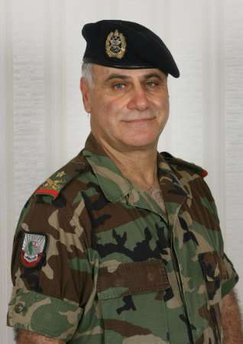 The new chief of the Lebanese army, Jean Kahwaji, has been promoted to general in a ceremony attended by his predecessor, President Michel Suleiman. Gen Kahwaji was appointed to the post at a meeting of the national unity government on Friday evening. The 54-year-old Maronite Christian had been a brigade commander since 2002. Many Lebanese regard the army as one of the country’s few neutral institutions, and say it plays an important role in preventing sectarian conflict.
The new chief of the Lebanese army, Jean Kahwaji, has been promoted to general in a ceremony attended by his predecessor, President Michel Suleiman. Gen Kahwaji was appointed to the post at a meeting of the national unity government on Friday evening. The 54-year-old Maronite Christian had been a brigade commander since 2002. Many Lebanese regard the army as one of the country’s few neutral institutions, and say it plays an important role in preventing sectarian conflict.
"The Council of Ministers decided to appoint General Jean Kahwaji to the post of chief of the Lebanese army," Mitri told reporters at the end of a cabinet meeting at the presidential palace. Kahwaji, 54, joined the army in 1973. He has undergone specialised military training abroad, including in the United States and Italy, while in 2006 he went to Germany for intensive anti-terrorism training. Decorated on several occasions, he has occupied the post of commander of the second infantry division since 2002. He is married with three children. General Shawki al-Masri, the army’s chief of staff, had been acting as head of the army since Sleiman was elected president of Lebanon on May 25, ending a drawn-out political crisis in the country. Observers say the 60,000-strong majority Shiite Lebanese army is these days more of a peacekeeping unit than an offensive force. At the end of 2006, Sleiman claimed that the army was "unified" — unlike it had been during the 1975-1990 civil war when it was bitterly divided along confessional lines.
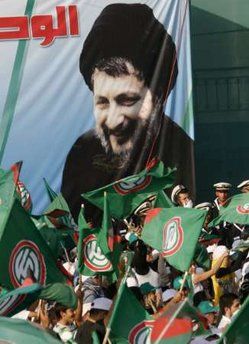 BEIRUT (AFP) – Several thousand people joined a rally in Lebanon on Sunday to mark 30 years since Shiite leader Mussa Sadr vanished without trace in Libya, with the circumstances of his disappearance as mysterious as ever. Sadr, who founded the opposition Amal movement now led by Parliament Speaker Nabih Berre would have been 80 this year and is still regarded by the Lebanese Shiite community as their key spiritual guide. Lebanon last week issued an arrest warrant for Libyan leader Moamer Kadhafi over the disappearance of the imam on August 31, 1978 while he was in Tripoli with two companions, who vanished with him. "We tell the leader of the Libyan regime Moamer Kadhafi: you are personally responsible for the disappearance of Imam Mussa Sadr," Berri said in a speech to the crowds in the southern town of Nabatiyeh."Let no-one think that we will forget or make any compromise," said Berri, a leading figure in the Syrian-backed opposition in Lebanon spearheaded by the powerful Hezbollah movement. Libya has denied involvement in Sadr’s disappearance, saying he left Libya for Italy. But the Italian government has always denied he ever arrived there. However, in 2004 Italian authorities returned a passport found in Italy belonging to the imam.
BEIRUT (AFP) – Several thousand people joined a rally in Lebanon on Sunday to mark 30 years since Shiite leader Mussa Sadr vanished without trace in Libya, with the circumstances of his disappearance as mysterious as ever. Sadr, who founded the opposition Amal movement now led by Parliament Speaker Nabih Berre would have been 80 this year and is still regarded by the Lebanese Shiite community as their key spiritual guide. Lebanon last week issued an arrest warrant for Libyan leader Moamer Kadhafi over the disappearance of the imam on August 31, 1978 while he was in Tripoli with two companions, who vanished with him. "We tell the leader of the Libyan regime Moamer Kadhafi: you are personally responsible for the disappearance of Imam Mussa Sadr," Berri said in a speech to the crowds in the southern town of Nabatiyeh."Let no-one think that we will forget or make any compromise," said Berri, a leading figure in the Syrian-backed opposition in Lebanon spearheaded by the powerful Hezbollah movement. Libya has denied involvement in Sadr’s disappearance, saying he left Libya for Italy. But the Italian government has always denied he ever arrived there. However, in 2004 Italian authorities returned a passport found in Italy belonging to the imam.
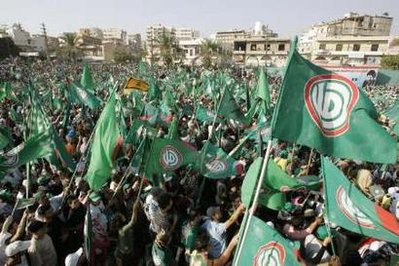 Sunday marked 30 years since the disappearance of Imam Musa al-Sadr, a Lebanese icon who put his country’s Shiite community on the road to sociopolitical revival long before the 1979 Islamic Revolution In Iran brought a more radical flavor to the phenomenon on the regional level. The details of Sadr’s fate remain a mystery, but all signs point to the government of Libya, which is the last place where he was seen alive. Tripoli has staunchly – but not very convincingly – denied any involvement, preventing the two countries from improving their bilateral relationship and foiling any form of "closure" to many Lebanese Shiites who still believe that their hero continues to languish in captivity. As it happens, the anniversary followed just a day after visiting Italian Prime Minister Silvio Berlusconi performed a remarkable act of contrition in Benghazi, apologizing to all Libyans for his own country’s colonial-era atrocities and pledging billions of dollars in investment as a mechanism of indirect compensation. But Moammar Gadhafi’s regime need not look to Rome for an example of how to properly turn the page: In the past few years, his own government has closed several embarrassing files, including its efforts to develop weapons of mass destruction and the involvement of its intelligence officers in the 1988 Lockerbie airliner bombing. Sayyed Hassan Nasrallah, leader of Hizbullah, has invited the Libyans to come clean on Sadr’s disappearance as well, and Tripoli could do itself a favor by accepting it. As demonstrated by last week’s filing of charges against Gadhafi by a Lebanese prosecutor, this issue will not go away – particularly when Hizbullah and Amal, two Shiite parties that form a large part of Sadr’s legacy, remain in ascendance.
Sunday marked 30 years since the disappearance of Imam Musa al-Sadr, a Lebanese icon who put his country’s Shiite community on the road to sociopolitical revival long before the 1979 Islamic Revolution In Iran brought a more radical flavor to the phenomenon on the regional level. The details of Sadr’s fate remain a mystery, but all signs point to the government of Libya, which is the last place where he was seen alive. Tripoli has staunchly – but not very convincingly – denied any involvement, preventing the two countries from improving their bilateral relationship and foiling any form of "closure" to many Lebanese Shiites who still believe that their hero continues to languish in captivity. As it happens, the anniversary followed just a day after visiting Italian Prime Minister Silvio Berlusconi performed a remarkable act of contrition in Benghazi, apologizing to all Libyans for his own country’s colonial-era atrocities and pledging billions of dollars in investment as a mechanism of indirect compensation. But Moammar Gadhafi’s regime need not look to Rome for an example of how to properly turn the page: In the past few years, his own government has closed several embarrassing files, including its efforts to develop weapons of mass destruction and the involvement of its intelligence officers in the 1988 Lockerbie airliner bombing. Sayyed Hassan Nasrallah, leader of Hizbullah, has invited the Libyans to come clean on Sadr’s disappearance as well, and Tripoli could do itself a favor by accepting it. As demonstrated by last week’s filing of charges against Gadhafi by a Lebanese prosecutor, this issue will not go away – particularly when Hizbullah and Amal, two Shiite parties that form a large part of Sadr’s legacy, remain in ascendance.
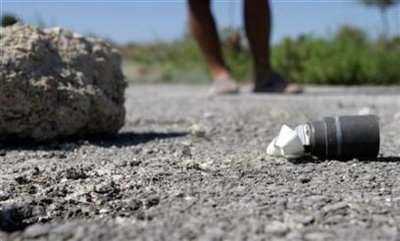 TYRE, Lebanon (Reuters) – Many of the 44 teams clearing cluster munitions scattered by Israel in south Lebanon during its 2006 war with Hezbolah will have to stop work this month for lack of funds, a U.N. spokeswoman said on Friday Donors have failed to come up with a promised $4.7 million needed to fund the program in 2008, according to Dalya Farran of the U.N. Mine Action Coordination Centre (UNMACC). "A very large number of the clearance teams will be stopping by the end of this month if we don’t get funds before that," she said, adding that some donor countries had not kept their promises and others had lost interest two years after the war.
TYRE, Lebanon (Reuters) – Many of the 44 teams clearing cluster munitions scattered by Israel in south Lebanon during its 2006 war with Hezbolah will have to stop work this month for lack of funds, a U.N. spokeswoman said on Friday Donors have failed to come up with a promised $4.7 million needed to fund the program in 2008, according to Dalya Farran of the U.N. Mine Action Coordination Centre (UNMACC). "A very large number of the clearance teams will be stopping by the end of this month if we don’t get funds before that," she said, adding that some donor countries had not kept their promises and others had lost interest two years after the war.
UNMACC has led efforts to clear thousands of unexploded cluster bomblets left over after Israel’s war with Lebanese Hezbollah guerrillas. Israel fired or dropped most of the munitions in the last 72 hours before an August 14 ceasefire. Since then 27 civilians have been killed and 234 wounded by unexploded ordnance, mostly cluster munitions, while 13 bombs disposal experts have been killed and 39 wounded, Farran said. Any reduction in clearance work would lead to a higher accident rate because past experience shows that villagers will attempt to deal with the bomblets themselves if they believe that no disposal teams will do the job, Farran said.
DAMASCUS (AFP) – Syria and Lebanon agreed on Thursday to take formal steps to demarcate their borders as part of a string of decisions to normalise their relations for the first time after decades of tension. The announcement came as President Michel Sleiman wrapped up a landmark two-day visit to Damascus — the first by […]
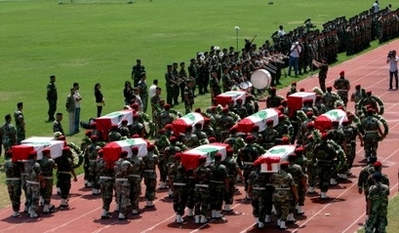 TRIPOLI, Lebanon (AFP) – The Lebanese army on Thursday held an emotional ceremony for nine soldiers who were among 14 people killed in a bomb attack the previous day that targeted the military in northern Lebanon. But even as the ceremony was underway in the tense northern city of Tripoli a man was shot and wounded near flashpoint neighbourhoods where 23 people were killed in sectarian fighting in June and July, a police official said. Thunderous applause broke out as nine coffins draped in Lebanese flags were carried shoulder high by comrades of the dead soldiers into a sports stadium in the port city. Another group of soldiers carrying wreath composed of white, red and green flowers — the colours of the Lebanese flag — preceded the pall-bearers into the stadium.Interior Minister Ziad Baroud and acting army chief Shawki al-Masri attended the ceremony alongside relatives and friends of the soldiers, who wept as the coffins were brought into the stadium to a full military salute. The soldiers aged between 21 and 32 were killed when a bomb hidden in a bag exploded near a bus stop during morning rush hour on Wednesday. A shoeshine boy was among the five other civilians killed in the attack. The attack was the deadliest in the troubled country in three years and came only hours before President Michel Sleiman, the former army chief, was due to begin a visit to neighbouring Syria to launch first ever diplomatic ties. President Suleiman held a meeting with security officials in the presence of Defense, Interior and Finance minister to direct the investigation. Forty people were also injured in the attack. Masri denounced what he called "cowardly terrorism which targets the Lebanese army" and said that the attack "will not deter the army from its duty to defend the nation." Shawki has been at the helm of the army since Sleiman was elected president on May 25, after rival politicians reached a power-sharing agreement in the Qatari capital of Doha to end 18 months of political crisis. Prime Minister Fuad Siniora, whose recently-formed cabinet was confirmed by parliament just a day before the attack, called for three days of mourning across Lebanon from Thursday. Siniora had also called for a one-hour work-stoppage across the country at midday Thursday. The call was heeded throughout Tripoli where residents also observed five minutes of silence at the request of the prime minister, while black flags decked Lebanon’s second city in sign of mourning. Funerals for the soldiers will be held privately.
TRIPOLI, Lebanon (AFP) – The Lebanese army on Thursday held an emotional ceremony for nine soldiers who were among 14 people killed in a bomb attack the previous day that targeted the military in northern Lebanon. But even as the ceremony was underway in the tense northern city of Tripoli a man was shot and wounded near flashpoint neighbourhoods where 23 people were killed in sectarian fighting in June and July, a police official said. Thunderous applause broke out as nine coffins draped in Lebanese flags were carried shoulder high by comrades of the dead soldiers into a sports stadium in the port city. Another group of soldiers carrying wreath composed of white, red and green flowers — the colours of the Lebanese flag — preceded the pall-bearers into the stadium.Interior Minister Ziad Baroud and acting army chief Shawki al-Masri attended the ceremony alongside relatives and friends of the soldiers, who wept as the coffins were brought into the stadium to a full military salute. The soldiers aged between 21 and 32 were killed when a bomb hidden in a bag exploded near a bus stop during morning rush hour on Wednesday. A shoeshine boy was among the five other civilians killed in the attack. The attack was the deadliest in the troubled country in three years and came only hours before President Michel Sleiman, the former army chief, was due to begin a visit to neighbouring Syria to launch first ever diplomatic ties. President Suleiman held a meeting with security officials in the presence of Defense, Interior and Finance minister to direct the investigation. Forty people were also injured in the attack. Masri denounced what he called "cowardly terrorism which targets the Lebanese army" and said that the attack "will not deter the army from its duty to defend the nation." Shawki has been at the helm of the army since Sleiman was elected president on May 25, after rival politicians reached a power-sharing agreement in the Qatari capital of Doha to end 18 months of political crisis. Prime Minister Fuad Siniora, whose recently-formed cabinet was confirmed by parliament just a day before the attack, called for three days of mourning across Lebanon from Thursday. Siniora had also called for a one-hour work-stoppage across the country at midday Thursday. The call was heeded throughout Tripoli where residents also observed five minutes of silence at the request of the prime minister, while black flags decked Lebanon’s second city in sign of mourning. Funerals for the soldiers will be held privately.
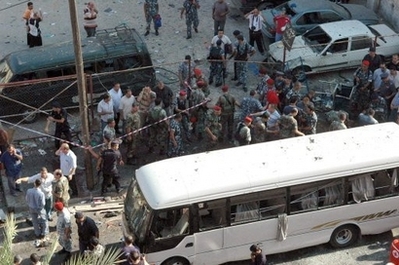 By Nazih Siddiq , TRIPOLI, Lebanon (Reuters) – A bomb killed at least 14 people, including nine soldiers, at a bus stop in the northern Lebanese city of Tripoli on Wednesday, security sources said. The bomb, which also wounded at least 45 people, was the deadliest attack on the army since its battle with al Qaeda-inspired Islamist militants in the north last year. It had been placed in a bag at the bus stop where soldiers usually gather, the army said in a statement, describing the attack as a "terrorist bombing" — a phrase used in the past by the military when it suspects militant Islamist involvement. The army put the initial death toll at 11 but other medical and security sources said it had risen as casualties died from their wounds. The blast struck at 7.45 a.m. (5:45 a.m. British time) as people made their way to work. Red Cross workers ferried casualties to hospital. The ground was spattered with blood and covered in shards of glass, television pictures showed. There were no immediate claims of responsibility for the attack in Lebanon’s second largest city, which has been the scene of fighting between security forces and Islamist militants and sectarian violence linked to political tension in Lebanon. "The army and security forces will not yield to attempts to terrorise them with attacks and crimes," said President Michel Suleiman, who had been army chief until his election in May.
By Nazih Siddiq , TRIPOLI, Lebanon (Reuters) – A bomb killed at least 14 people, including nine soldiers, at a bus stop in the northern Lebanese city of Tripoli on Wednesday, security sources said. The bomb, which also wounded at least 45 people, was the deadliest attack on the army since its battle with al Qaeda-inspired Islamist militants in the north last year. It had been placed in a bag at the bus stop where soldiers usually gather, the army said in a statement, describing the attack as a "terrorist bombing" — a phrase used in the past by the military when it suspects militant Islamist involvement. The army put the initial death toll at 11 but other medical and security sources said it had risen as casualties died from their wounds. The blast struck at 7.45 a.m. (5:45 a.m. British time) as people made their way to work. Red Cross workers ferried casualties to hospital. The ground was spattered with blood and covered in shards of glass, television pictures showed. There were no immediate claims of responsibility for the attack in Lebanon’s second largest city, which has been the scene of fighting between security forces and Islamist militants and sectarian violence linked to political tension in Lebanon. "The army and security forces will not yield to attempts to terrorise them with attacks and crimes," said President Michel Suleiman, who had been army chief until his election in May.
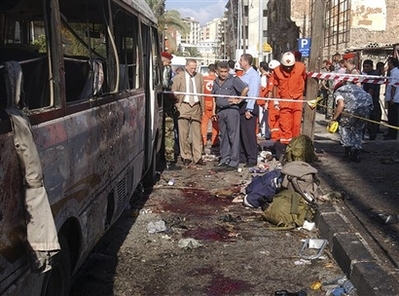 (AFP) by Omar Ibrahim, A child who was polishing shoes on the street was among the 14 dead, the official said, adding that nine of those killed and many of the wounded were soldiers. "My son! My son!," screamed one mother striking her chest at a Tripoli hospital after learning that her 22-year-old soldier son was dead. It was the deadliest attack on the army since a 15-week battle last year the Al-Qaeda inspired Fatah al-Islam militia in an impoverished Palestinian refugee camp near Tripoli that left 400 people dead, including 168 soldiers. The army said the bomb was planted in a bag at a military gathering point in the Masarif Street commercial district of Tripoli and exploded near a public bus carrying soldiers from the northern region of Akkar. "The terrorist explosion directly targets the army and peaceful co-existence in the country," it said in a statement. The attack also came just a day after a national unity government formed by Prime Minister Fuad Siniora following 18 months of deadly tensions with the Hezbollah-led opposition finally won a vote of confidence in parliament. The crisis had pushed the country to the brink of a new civil war and was only ended by an Arab-brokered power-sharing agreement in May.
(AFP) by Omar Ibrahim, A child who was polishing shoes on the street was among the 14 dead, the official said, adding that nine of those killed and many of the wounded were soldiers. "My son! My son!," screamed one mother striking her chest at a Tripoli hospital after learning that her 22-year-old soldier son was dead. It was the deadliest attack on the army since a 15-week battle last year the Al-Qaeda inspired Fatah al-Islam militia in an impoverished Palestinian refugee camp near Tripoli that left 400 people dead, including 168 soldiers. The army said the bomb was planted in a bag at a military gathering point in the Masarif Street commercial district of Tripoli and exploded near a public bus carrying soldiers from the northern region of Akkar. "The terrorist explosion directly targets the army and peaceful co-existence in the country," it said in a statement. The attack also came just a day after a national unity government formed by Prime Minister Fuad Siniora following 18 months of deadly tensions with the Hezbollah-led opposition finally won a vote of confidence in parliament. The crisis had pushed the country to the brink of a new civil war and was only ended by an Arab-brokered power-sharing agreement in May.
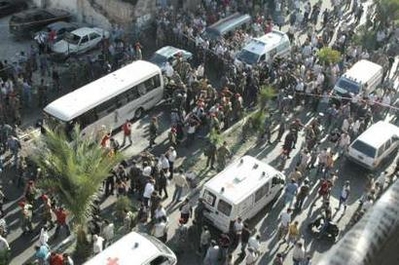 Sleiman, who was army chief until his election as president by MPs in May, condemned what he called a "terrorist crime," a sentiment echoed by Syria. "The army and security forces will not be terrorised by attacks and crimes that target it and civil society, and the history of the army attests to that," Sleiman said in a statement. The security official said the bomb was packed with 20 kilogrammes (44 pounds) of explosives, and the force of the blast blew the remains of some of the dead on to the roofs of nearby buildings. The Mediterranean port city has been rocked by deadly violence between anti-Syrian supporters Siniora and his Damascus-backed rivals amid a long-running political crisis. In Tripoli, desperate families gathered at four hospitals to check on the fate of their loved ones but were blocked by security from entering. One hospital official said identification was delayed because some bodies were mutilated beyond recognition. "The hands of the criminals have hit in Tripoli," said Information Minister Tareq Mitri. "The investigation has begun and there are many interpretations, political interpretations."
Sleiman, who was army chief until his election as president by MPs in May, condemned what he called a "terrorist crime," a sentiment echoed by Syria. "The army and security forces will not be terrorised by attacks and crimes that target it and civil society, and the history of the army attests to that," Sleiman said in a statement. The security official said the bomb was packed with 20 kilogrammes (44 pounds) of explosives, and the force of the blast blew the remains of some of the dead on to the roofs of nearby buildings. The Mediterranean port city has been rocked by deadly violence between anti-Syrian supporters Siniora and his Damascus-backed rivals amid a long-running political crisis. In Tripoli, desperate families gathered at four hospitals to check on the fate of their loved ones but were blocked by security from entering. One hospital official said identification was delayed because some bodies were mutilated beyond recognition. "The hands of the criminals have hit in Tripoli," said Information Minister Tareq Mitri. "The investigation has begun and there are many interpretations, political interpretations."
كلمة النائب الدكتور فريد الياس الخازن
في جلسة مناقشة البيان الوزاري (حكومة الرئيس السنيورة الثانية)
11/8/2008
انه بيان حكومة في دولة كأنها في طور التأسيس. لا عجب في ذلك بعد المخاض العسير الذي سبق ورافق تشكيل حكومة جامعة انتظرنا ولادَتها قبل ثلاث سنوات, والتي نطمح ان تكون فعلا حكومة الارادة الوطنية الجامعة.
الى اليوم, وللاسف, لم تكن الارادة الوطنية جامعة سوى في الازمات والانقسامات. الازمة السياسية البالغة التعقيد التي مرت بها البلاد انتجت تسوية سياسية تبلورت في اتفاق الدوحه, وهو الاتفاق اللبناني
المسيحيون بين حقوقهم ودورهم وصلاحياتهم
جريدة النهار في 07 آب 2008
بقلم سجعان قزي
يمزج المسيحيون اللبنانيون، لاسيما الموارنة منهم، بين حقوقهم ودورهم وصلاحياتهم. حقوق المسيحيين هي نفسها التي يتمتع بها أي مواطن لبناني. ولأنها كذلك يحفظها الدستور والقانون، ولو أصبح عددهم واحداً فقط (قاعدة المساواة). غير أن دور المسيحيين هو المميز. ولأنه كذلك فلا يضمنه سواهم، ولو اعترف به ألف ميثاق وألف عُرف؛ وضمانته سلوك مسيحي خلاّق وطنياً وحضارياً وأخلاقياً (قاعدة الاستحقاق). أما صلاحياتهم فهي مُحَـصِّلة دستورية لمجموعة عناصر تاريخية ومشرقية وغربية، ولمجموعة موازين سياسية وعسكرية وديمغرافية. ولأنها كذلك فهي عرضة للتقييم حسب تطور مجموعة هذه العناصر والموازين، ولكن مهما تعدّلت هذه الصلاحيات، لا يجوز أن تمس دور المسيحيين السياسي والوطني، أو حقوقهم الإنسانية والطائفية في لبنان (قاعدة التعددية الحضارية).
مسؤولية ضعف الدور المسيحي
لذلك، حريّ بالمسيحيين أن يَشْكوا من ضعف دورهم لا من افتئات حقوقهم، ومن تساهل عدد من قادتهم لا من تقليص صلاحياتهم. فحقوق كل المواطنين مهضومة بحكم تقصير الدولة وعجزها البنيوي والمادي. وصلاحيات كل الطوائف معطلة مع تغييب الدولة، أو تُمارس خارج الشرعية.
كانت الدولة اللبنانية تشبه سيارة يقودها ماروني بصلاحيات تسمح له التحكّم بالمِقْـوَد وعُلبة السرعة والفرامل. جاء دستور الطائف فأبقى المِقْـوَد بيد الماروني، وانتزع منه السنّي علبة السرعة والشيعيّ الفرامل، فتوقفت السيارة لأن كل طرف استعمل الجزء الذي استولى عليه باتجاه معاكس للجزأين الآخرَين. واليوم الدولة اللبنانية في المرآب، وغداً قد تُباع قِطعَ غِيارٍ مستعملة لدويلات ناشئة (مشهد مبكٍ)، لكن الماروني والسني والشيعي سيحتفظون بالمقود وعلبة السرعة والفرامل من دون سيارة (مشهد مضحك).



